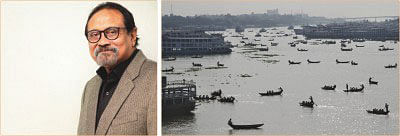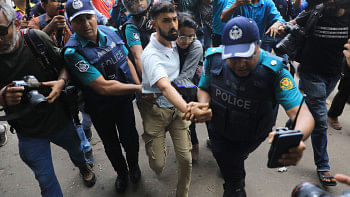Spicy Bites

Photo: Amirul Rajiv
One of the few veterans who played an unequivocal role in shaping the country's theatre scene, and also a freedom fighter, Aly Zaker has a bold presence on stage, and the big and small screens. He is also a recognised writer and photo enthusiast. He has several published books, with the upcoming book fair to bring more releases.
Zaker recently came to The Daily Star (TDS) office and we picked up on his lifelong association with rivers.
TDS: Tell us about your childhood memories of rivers.
Zaker: I have many fond memories involving rivers. The first of these would have to be a journey from Khulna to Goalanda. We had to make the trip as my father, an ADC of Khulna at the time, was transferred to Kushtia. I was only six years old when we took a trip covering three-days and three-nights on a steamer to reach our destination. It was a wonderful journey with the full moon illuminating the sky and fresh ilish and ilish kebabs being cooked on board.
I fell in love with the Gorai river after reaching Kushtia. Gorai used to be a very powerful river back then, especially during the monsoon, but dried up during winter to allow us to walk across it. A memoir featuring those times will come out at the next Ekushey Book Fair. I once walked all the way to Shilaidaha when I was in class seven or eight.
One day my younger sister and I nagged our elder brother to teach us how to swim, as he was a great swimmer. So bhaiya went down to waist-high water of a small lagoon and asked us to take a dip. But before I knew it he threw me in deep water. I was struggling to stay afloat and was sure that I would die. Suddenly I found ground beneath my feet and was relieved. Seeing me struggling in water, my frightened sister ran to our house. At that time, she didn't learn to swim, but I did.
I have another story about my elder brother. Like I said, he was a great swimmer -- a college champion in free style. One day, probably on a Sunday, we were sitting idle, and our father reading a newspaper. Someone came and told us that “Chhoto Shaheb” [my elder brother] was seen floating away in the river. He added that “Chhoto Shaheb” is probably dead. My father immediately called the police. Kushtia was a small town and word spread fast. Everyone came to our house to express their grief. My mother, younger sister, and my elder sister who is no more, were all crying their eyes out. My father just sat silently on the roof after hearing the news. Suddenly a police officer came and told my father that my brother had been found. My father solemnly asked where the body was. But the officer said that my brother was alive and was walking towards our home. He added that bhaiya even ignored his offer to take a ride on a jeep. My father rushed to his room and came back with a belt. I knew what was to come and rushed to bhaiya to warn him of father's imminent wrath. Bhaiya just smiled and gave me a guava that he had with him, and continued walking towards home. I pleaded with him, but he didn't listen. By that time, father had come down from the roof. Our mother started shouting and urged him not to beat up my brother. When they came face to face, they started at each other for some time. My father unexpectedly broke into tears and hugged my brother. This is a very personal story. A river is not directly connected to the story, but the memories definitely feature the river.
We began to frequently visit our native home in Ratanpur village of Brahmanbaria, after father was transferred to Dhaka sometimes later. The village is very close to the Meghna river. Monsoon invariably meant flooding. A small river, which used to be a canal, flows beside the village. For some reason, the villagers named it Jamuna. Maybe when one cannot find an interesting name for a river, they start calling it “Jamuna”. Anyway, father used to take us to Ratanpur during the months of Kartik-Agrahayan [late autumn]. We used to board launches at Sadarghat. The launches lifted anchor in the wee hours of the night and reached Ramkrishnapur, the closest ghaat to our village, in early morning. We had a family boat then, a tradition that I still continue.
TDS: Many of our rivers are dying. If you were given the task of putting an end to this, how would you save the rivers?
Zaker: I alone would not be able to do anything.
TDS: How would you gather support for this cause?
Zaker: First we have to identify who are responsible and why are they doing this to the rivers. People misuse rivers, creating a mess. Buriganga is a prime example. The polythene that has gathered on the riverbed is unlikely to go away in a million years. Only the government can solve this. We, as citizens, could stop dumping polythene and toxic materials into the river.
TDS: What methods should be used to create awareness?
Zaker: We should carry out campaigns. We have to go to the sites and interact with people to make them aware of the crisis.
TDS: What role can the media play?
Zaker: The media can carry out campaigns on the woes caused by the pollution and filling up of rivers. When someone throws away rubbish or polythene, they think they are the only ones doing so. But 16 crore people are doing and thinking the same. This mindlessness causes water-logging in the cities. My driver says that the government has nothing to do on this issue, as we ourselves are the culprits here. The administration has little to do when we indiscriminately dump polythene. If we don't change ourselves, the situation will not see a solution. Mass campaigns by the media can greatly help in creating awareness.
TDS: Can documentaries on this issue be shown at district level?
Zaker: That would be very helpful. It is my observation that every Bangladeshi village has one or two influential individuals who can change the fate of the entire village. These people should be on board if these issues are to be resolved.
TDS: Why are rivers so important?
Zaker: Every civilisation had built itself around rivers. There will be no cities, if the rivers die.
TDS: Buriganga has turned black from pollution…
Zaker: I know. Once the members of Nagorik troupe went on a picnic on Buriganga. When we were returning, I stepped into the water. I had to get medical treatment for two months for the infection that caused. This is the harsh reality of Buriganga. People somehow even bathe in its water.

 For all latest news, follow The Daily Star's Google News channel.
For all latest news, follow The Daily Star's Google News channel. 



Comments